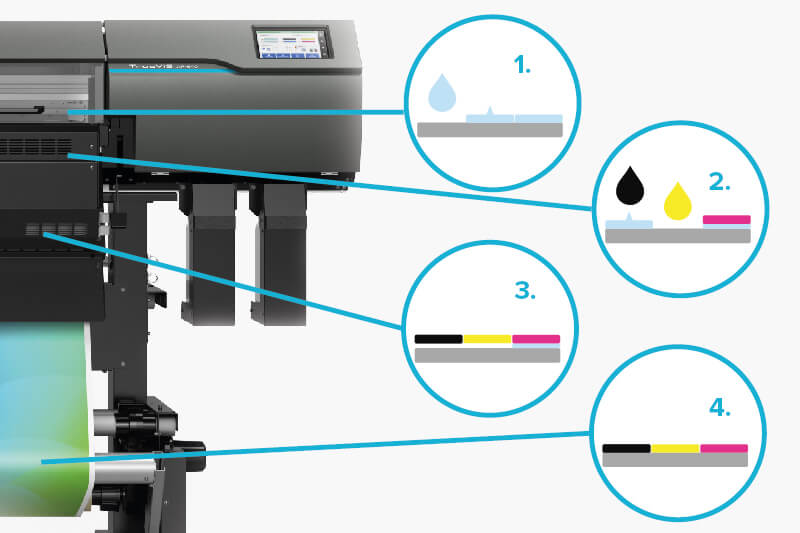As with so much of what we see in the digital print world, there is a lot more to ink than first meets the eye. Printer hardware has undergone rapid and major advances during the last 20 to 30 years, and so has ink technology. From the way the print-heads distribute the ink and the speed and precision that it's laid onto the media, to the many surfaces it can be printed on, the colors that can be printed and the rate that it dries, ink innovations have created incredible opportunities for businesses of all sizes. In this article, we will examine the features of one of the increasingly popular ink technologies available to us: Resin ink, also known as latex ink.
An Introduction to Inks
As important as your printer hardware is to delivering the quality your customers demand, it's also important to understand the features of specific inks and how they can benefit your
production.
A resin ink-printed painting on a wall. The three main types of ink today are:
Solvent/ Eco-solvent – These inks have long been the industry standard for the outdoor graphics market due to their water resistance and durability. Modern eco-solvent ink sets like those in Roland DG's TrueVIS TR2 ink family, are environmentally friendly and offer users a wide and vibrant color gamut.
UV– UV inks, such as Roland DG's ECO-UV5 (EUV5) and V-BOND inks, cure instantly thanks to the printer's on-board UV lamps and a huge range of substrates. The ink stays on the surface of the media rather than being absorbed, making it ideal for standard applications, as well as packaging prototypes or for creating textures and special effects by printing layers of gloss ink.
Resin or latex – Resin inks, like Roland DG's TrueVIS Resin formulations, are water based, quick-drying, scratch-resistant, and safe on a wide range of media, making them ideal for wall décor, indoor signs, floor graphics, retail displays, and many other applications All three types of ink have ingredients that include color pigment, binders and drying agents, specifically formulated for the ink and with applications in mind. They each behave and react differently with the surface that they are printed onto, meaning that the application will determine the type of ink that should be used.
Ultimately, they are all fantastic solutions when paired correctly to the application (as long as the inks are approved by the printer manufacturer, of course). The speed of ink delivery and quality of print onto surfaces that were impossible to imagine just a few years ago are only improving as innovations in the digital print industry continue to influence businesses and entrepreneurs. In addition, as our society continues to become more environmentally conscientious, the demand for more sustainable print options grows.
Understanding Resin Ink Technology
Latex or resin ink has been available for over a decade now. It was developed for specific applications and for users requiring high quality print, exceptional color saturation and the ability to print onto a broad range of substrates. Furthermore, it's fast drying for quick turnaround times and has reduced environmental impact.

Custom-printed wall graphics make a space more unique and inviting. (Credit: The Binary Box)
Resin ink shares many similarities with latex ink and, as a water-based solution with low volatile organic compound (or VOC) levels, it has become a popular option for large format printing for a wide variety of applications.
Interior Wall Graphics - Vibrant color makes resin ink an ideal choice for bringing bright and inviting imagery to home, office, and shop walls.
Stickers and Labels - Create impactful stickers and labels to personalize all sorts of items, from packaging and electronics to skateboards and band merchandise.
Office and Retail Graphics - Looking for ways to improve the look of a drab office space or shop? Add colorful graphics to surfaces including walls, floors, and windows.
Interior Decor - Resin ink is free from VOCs, meaning it is perfectly safe for interior print projects, such as wallpaper and nursery graphics.
Vehicle Graphics and Wraps - Showcase your brand while on the move with impressive color, excellent detail, fast turnaround times, and durable prints that last.
How Does Resin Ink Work?
Like any ink, there's a considerable amount of science that goes into creating resin ink. Below is a short explanation of its complex design that will help answer the question: Is resin ink the best choice for my requirements?

How printing resin ink works:
- An optimizer is printed onto the media to prepare it for receiving the ink. This helps to improve dot formation and reduces bleed into the material before it has a chance to dry, improving the overall quality of the final print.
- Resin ink is printed on top of the optimizer.
- The printed media is fed through the printer's dryer unit to fix the resin ink firmly in place.
- The print comes out dry, durable, and ready to be sent to the customer.
Resin is a high-quality, reliable, and resilient option when matched with vinyl, banner media, and paper because it covers well with good color retention and produces such a outstanding finish. No VOCs mean that it is odorless and kind to the environment, and while heat is used to cure the ink, it does so quickly and efficiently. Faster drying time means you can ship out your final product quickly and move onto the next job.
The finish is remarkably vibrant, making full use of the CMYK color gamut. Whether you are printing retail signage, exhibition graphics, or interior decor, the results are uniformly excellent.
Conclusion
Ink defines the performance of the print and the success of the application, so using the right formulation is crucial to getting the best results for your customer. Manufacturers are producing a range of advanced printing and ink technology options as economic, brand, and environmental standards all continue to progress.
Resin ink can be a great solution for interior graphics, retail graphics and many other applications, and is safe for use in hospitals, daycare facilities, office work environments, and homes. With deep rich color prints that are fast-drying, resin ink printers are a popular match for a wide variety of print needs.
Have more questions? Get in touch with one of our experts and we'll be happy to help. Contact us today.

